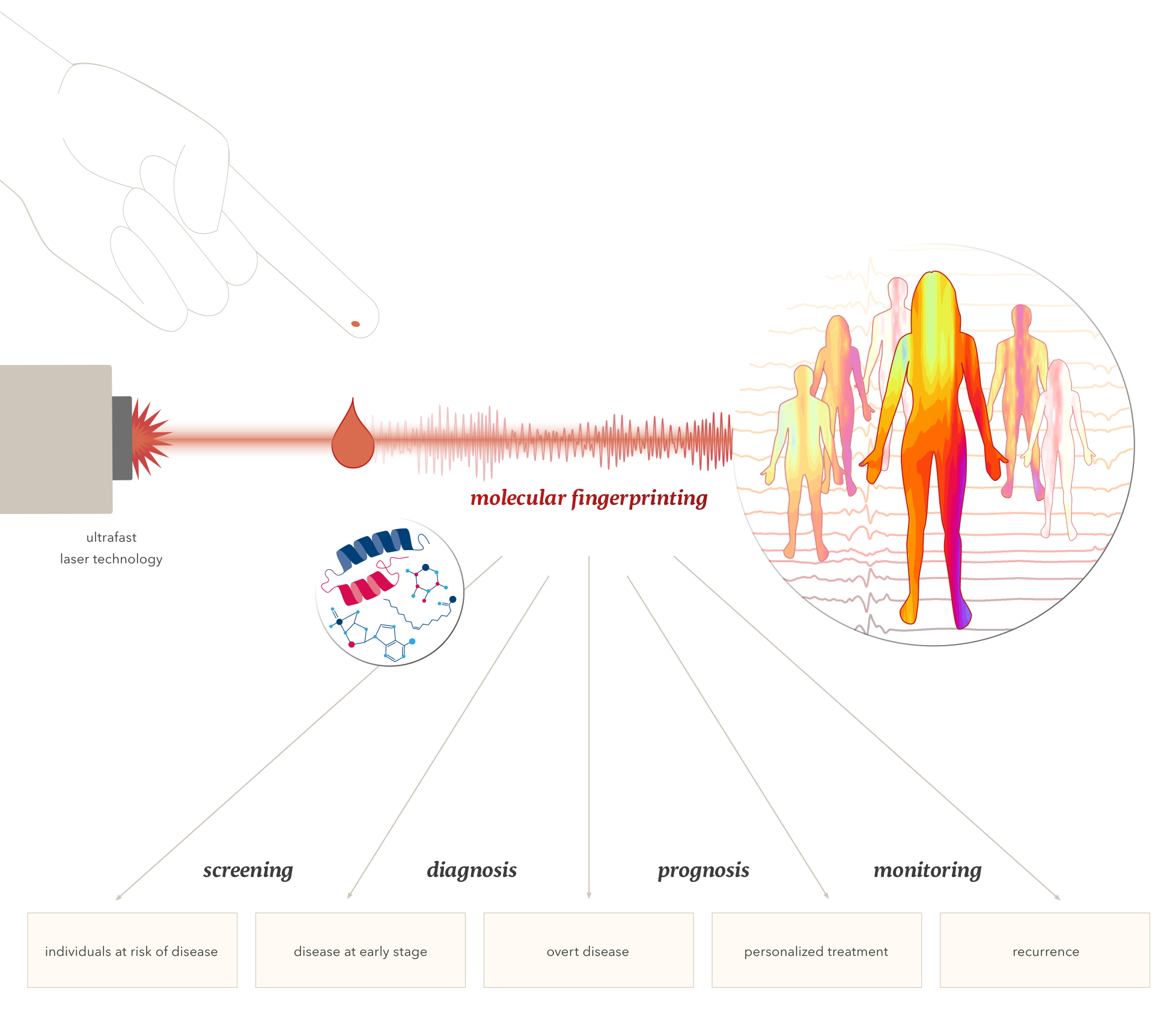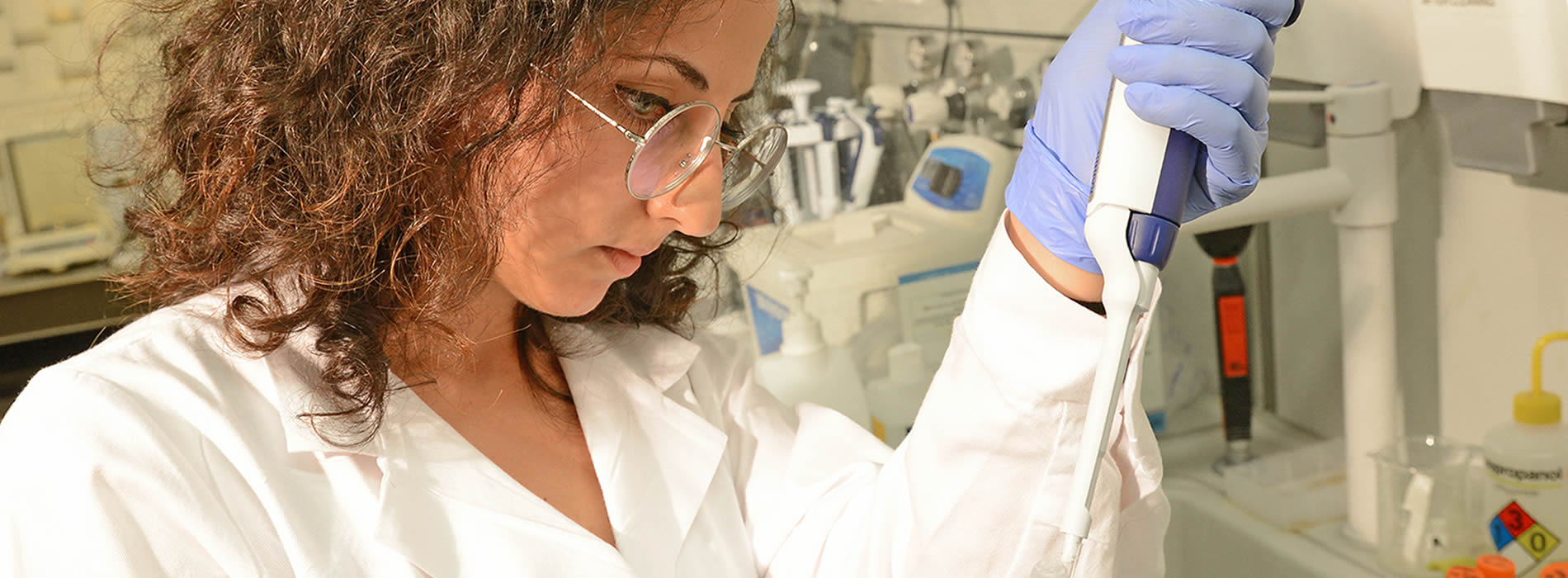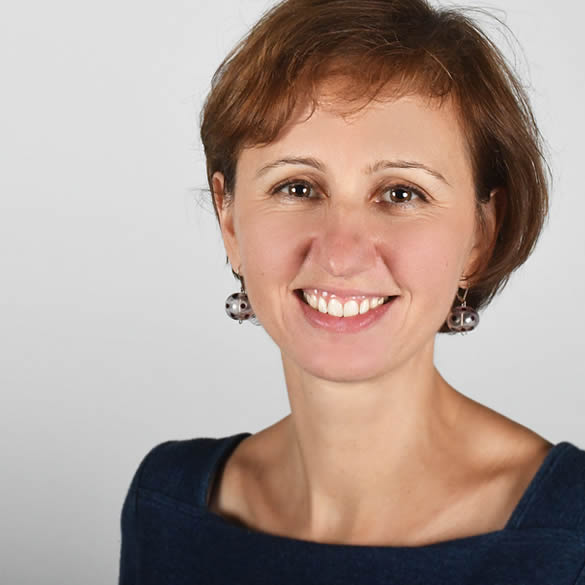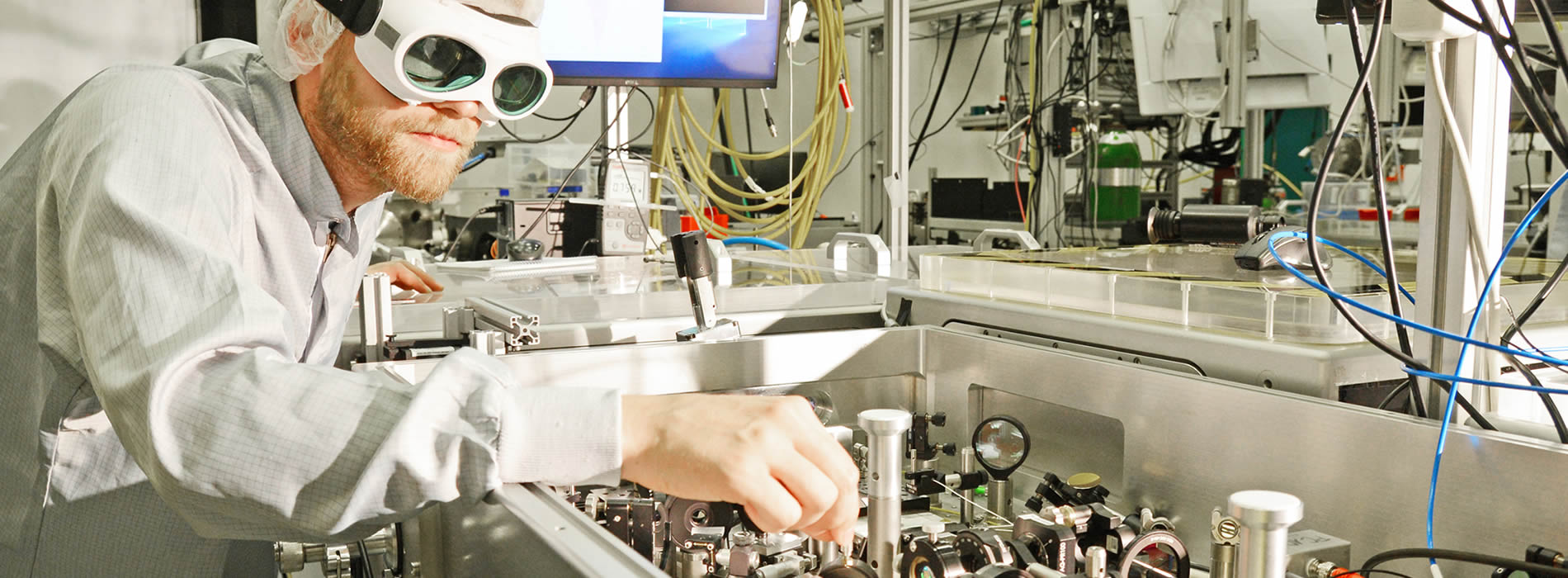Lasers4Life (L4L) is a collaborative effort between experts in laser physics, molecular sciences, modern medicine, and data analytics from Ludwig Maximilian University of Munich (LMU) and the Max Planck Institute for Quantum Optics (MPQ),
initiated by Nobel laureate Professor Ferenc Krausz.
Our goal is clear: To improve early detection of diseases, especially life-threatening diseases such as cancer. We are using advanced ultrashort pulsed laser technology to identify deviations from a healthy state as early as possible. Our aim is to continuously expand the possibilities of early disease detection for a healthier future.
To best detect, prevent, and treat disease, cost-effective, and timely diagnostics is critical. Lasers4Life establishes blood-based infrared spectroscopy combined with machine learning as a new technological platform for delivering systemic health evaluations. We aim to further advance our ongoing development of ultrashort laser technology to be used as a medical test in clinical practice for diagnosing common cancers, such as breast, lung, prostate, and bladder cancer.
more
The potential of Lasers4Life approach extends beyond traditional clinical laboratory testing, offering a cost-effective and high-throughput analytical approach that could lead to timely health diagnostics. This opens up prospects for several medical applications - from identifying disease conditions to determining a risk of an individual to develop a certain condition. As a large-scale clinical study, Lasers4Life provides a new avenue for holistic monitoring of health to support and empower reliable clinical decisions.


We have developed a novel technology - electric-field resolved molecular fingerprinting (EMF). EMF probes the full repertoire of all types of molecules in a bioliquid, within a single, sensitive measurement in a test tube - in vitro (Pupeza et al., Nature 2020).
The Lasers4Life-consortium has launched one of the world's largest series of clinical studies for evaluation of infrared spectroscopy as an in vitro diagnostic medical test.
Within the umbrella of Lasers4Life research program, national and international clinics, clinical centers, and academic institutions with unique expertise have joined forces.
Together, clinical blood samples are examined using the newly developed infrared spectroscopy to analyze the molecular patterns of molecules present in the blood. Through these large-scale investigations, differences in the molecular fingerprints, which indicate various cancers, are evaluated.
Our clinical trial is registered with the German Registry for Clinical Trials (DRKS) under the identification numbers DRKS00013217 (https://www.drks.de)
We are also exploring the possibility of whether and how infrared laser spectroscopy can be used to diagnose liver, colon, pancreatic, ear, nose and throat, stomach and ovarian cancers. Further studies of the Lasers4Life consortium are concerned with establishing the platform as generally applicable.

Imagine: You go in for a check-up. Your doctor takes a small amount of blood from you. The blood sample is analyzed with laser light, and just fifteen minutes later, your doctor knows whether you may already be suffering from an early stage of cancer or another common disease, or whether this can be ruled out.
This is still a vision of the future. But there is a chance for this scenario to find its way into clinics.
Questions about participating?
Contact Carola Pfundmeier & Sabine Witzens via our contact form or read
our questions & answers (FAQ).
Your contact persons for participation in the study or further project information:
089.4400.76726

|

|

|
| Jacqueline Aschauer | Carola Pfundmeier | Sabine Witzens |
Scientific Project leader and the contact for scientific enquiries:
Dr Mihaela Zigman:
mihaela.zigman @ mpq.mpg.de

|
| Mihaela Žigman, Dr. rer. nat. |
The Broadband Infrared Diagnostics team, led by Dr. Mihaela Zigman from LMU Physics, utilizes the latest laser technologies developed at the department of Dr. Ferenc Krausz to evaluate infrared molecular fingerprints as a new tool for cancer detection.

The following individuals, clinics, and academic research centers are our cooperation partners:
Die Urologische Klinik und Poliklinik, LMU Klinikum
(Prof. Dr. med. Christian Stief),
das Brustzentrum, Klinik und Poliklinik für Frauenheilkunde, LMU Klinikum
(Prof. Dr. med. Nadia Harbeck),
die Medizinische Klinik und Poliklinik V, LMU Klinikum
(Prof. Dr. med. Jürgen Behr),
die Klinik und Poliklinik für Radiologie, LMU Klinikum
(Prof. Dr. Maximilian Reiser, Prof. Dr. med. Jens Ricke),
die Klinik und Poliklinik für Hals-, Nasen- und Ohrenheilkunde, LMU Klinikum
(Prof. Dr. Martin Canis),
das Comprehensive Pneumology Center, LMU Klinikum
(CPC, PD Dr. Katrin Milger-Kneidinger),
Helmholtz-Zentrum München
(Prof. Dr. Anette Peters),
Medizinische Universität Graz
(Prof. Dr. med. Barbara Obermayer-Pietsch),
Dr. von Haunerschen Kinderspital
(Prof. Dr. med. Christoph Klein),
Pathologisches Institut LMU München
(Prof. Dr. med. Frederick Klauschen),
Max-Planck-Institut für Biochemie
(Prof. Dr. Matthias Mann),
Bavarian Center for Biomolecular Mass Spectrometry - Technical University Munich
(Dr. Christina Ludwig).